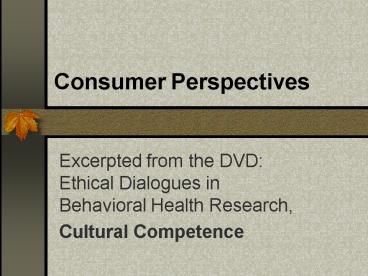Consumer Perspectives - PowerPoint PPT Presentation
1 / 12
Title:
Consumer Perspectives
Description:
Cultural Competence. Goals of ... Risks in Cultural Competence ... Cultural competence training for researchers. Inclusion of minority researchers in studies ' ... – PowerPoint PPT presentation
Number of Views:36
Avg rating:3.0/5.0
Title: Consumer Perspectives
1
Consumer Perspectives
- Excerpted from the DVD Ethical Dialogues in
Behavioral Health Research, - Cultural Competence
2
Goals of Cultural Competence
- Promote awareness of differences between
cultural/ethnic/racial/linguistic groups - Restore trust in research
- Enable inclusion of members of diverse groups
- Researchers need to ask how do the principles of
the Belmont Report apply to diverse groups - What benefits diverse groups?
- What harms diverse groups?
- How do diverse groups exercise their autonomy?
3
Risks in Cultural Competence
- Process of raising awareness of diverse groups
can contribute to the stereotyping of these
groups - Research is part of a historically racist society
- Perpetuated stereotypes
- Exploited disempowered groups
- The lives of members of certain culturally
diverse groups not valued as much as others - Exclusion of diverse groups from research led to
health disparities
4
Consumers As a Subculture
- Many mental health consumers view themselves as
part of an unique cultural community - Developed terms to refer to themselves (e.g.,
crazy folk, consumers/survivors, people with) - Developed unique forms of art, music, comedy,
theater, dance - Have coherent political agenda
- Hold the values of choice, autonomy, recovery,
and recognition of the whole person as primary - Have a unique personal history that they share
with other consumers - Provide peer support to each other
5
Stereotyping of Consumers
- People with psychiatric problems discriminated
against in society at large and in research - Particular forms of biomedical research viewed as
negative stereotyping by consumers - Studies focus on violence among people with
mental illness dangerous, unpredictable - Studies focus on deficits in persons with mental
illness hopeless, helpless - Studies focus on psychiatric diagnosis or illness
rather than personhood (wholeness of the
individual) - Refer to persons by their disease
6
Consumers and Family Members
- Values differ between mental health consumers and
their family members - Consumers value autonomy
- Family members promote promote protection,
classification of consumers as a vulnerable
population - Bound by a shared desire
- Well-being of mental health consumers
- Redressing ethical issues
7
Consumer Discussion Group 1
- Consumers are aware of past research abuse of
diverse cultural/ethnic/racial groups - Tuskegee
- Researchers didnt value the existence of African
Americans as much as others in society - In segregated society racial prejudice came
through the research - Nazi Doctors
- Have a fundamental mistrust of research
(especially mental health consumers of color) - Im afraid of researchers am on the defensive
because I dont want to be taken advantage of.
8
Consumer Discussion Group 1
- Researchers not aware of culture of diverse
groups - Researchers need to compensate for their lack of
knowing - Researchers need to do research on diverse group
culture before conducting a study with culturally
diverse participants - They need to learn more about the Black
population How we live and how we are.
9
Consumer Discussion Group 2
- How can researchers restore trust?
- Cultural competence training for researchers
- Inclusion of minority researchers in studies
- I had a dream to get a government grant to do
research and study African Americans in high
school. As a Black man I think I could do better
research for African Americans.
10
Participatory Research Models
- Inclusion of members of diverse populations as
co-investigators - Use of collaborative social processes in
production of research - Problems in participatory models
- Collaboration requires more time/planning
- Lack of community resources
- Technical assistance, transportation support,
access to computers and other technology required
so can be research partners
11
Other Inclusive Models
- Input from members of the community through
community meetings, focus groups, and Advisory
Board participation - Beneficial study designs
- Reliable research
- Researcher concerns about community member
inclusion - Participants lack research knowledge
- Participants try to control dissemination of
findings when study results are perceived as
culturally threatening - Participants battle for research resources
12
Other Inclusive Models
- Community Member Responsibilities
- Learn about research
- Follow responsible work practices
- Be deferential to others knowledge































![[PDF] Global Aging: Comparative Perspectives on Aging and the Life Course 2nd Edition Kindle PowerPoint PPT Presentation](https://s3.amazonaws.com/images.powershow.com/10079272.th0.jpg?_=202407160511)